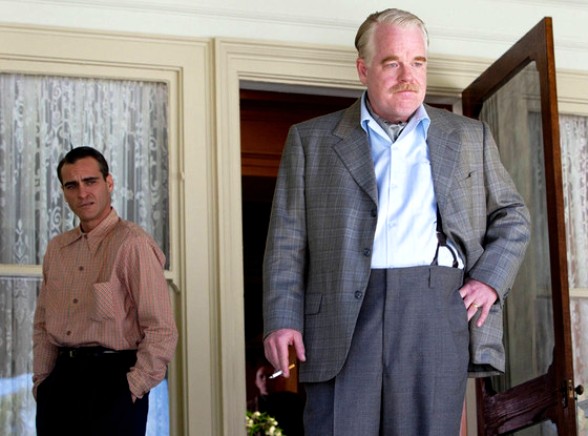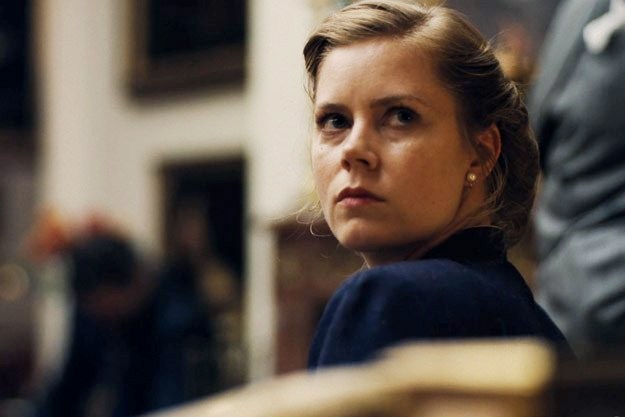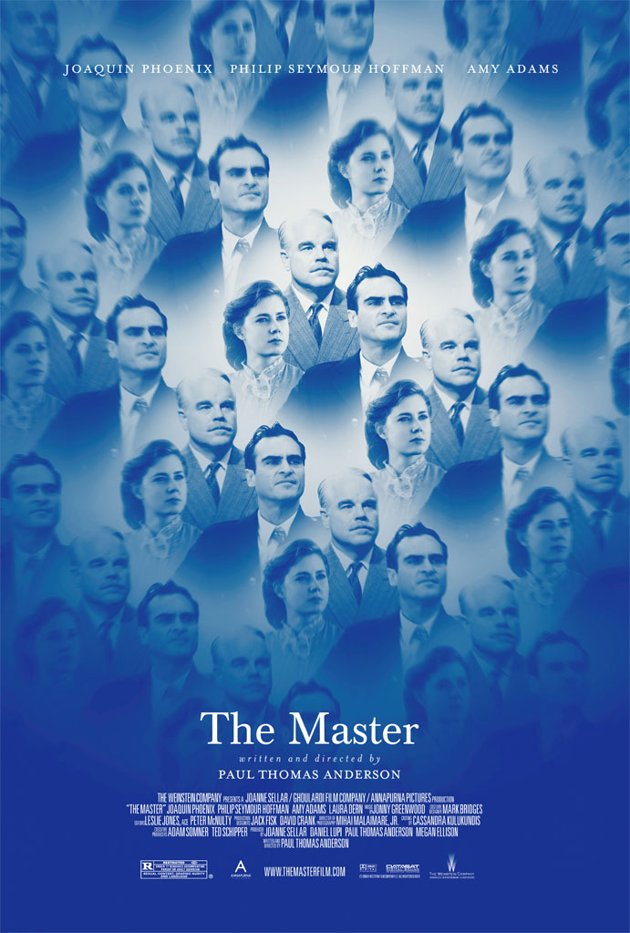
Tremendously skillful filmmaking but my fascination is at a detached mode. The scenes of The Master belong to both Joaquin Phoenix and Philip Seymour Hoffman, in a companion piece of tone to Paul Thomas Anderson’s previous opus “There Will Be Blood.” World War II is over, combat vet Freddie (Phoenix) returns home disillusioned and immerses himself perpetually as a sexaholic (masturbation, breasts, bush are explicit motifs). He migrates from town to town, job to job, until he stumbles upon a ship vessel occupying a braggart writer-philosopher (Hoffman). I swear I only heard his name Lancaster Dodd spoken aloud once. His character is loosely based on Scientology founder L. Ron Hubbard, and to my raised consciousness, I came out of the film and understood why for instance Tom Cruise acts the way he does. I think Cruise believes he is invincible. That does not make him a bad person in my book, I am only intrigued by his divergent human behavior.
If you’ve ever searched the net about the methods of Scientology, you’ve probably heard the term “auditing.” It’s 1950, and the Master calls his unrelenting Q&A sessions “processing.” Freddie participates for the Master in fun, but we’re not sure as to why he’d think it’s fun. Like men who climb mountains at high altitude, Freddie does it perhaps to prove himself unbreakable. In the most berserk but undeniably hilarious moment, Freddie answers “No” with a tight straight-face when asked if he suffers from erratic behavior.
 Anderson’s film is about a man who is not truthful with himself, that would be violence-prone Freddie. But does that assessment apply to the Master, too? The Master speaks about how humans are spirits that have been around for millions, no, trillions of years – that we are defeated by negative thoughts and actions in each lifetime. The goal is to commit to his new religion’s practices for purpose to strive to perfection. Two scenes prove that Lancaster the Master is only human himself, one involving himself at his bathroom sink along with his wife Peggy (Amy Adams), and the other one in actress Laura Dern’s final scene.
Anderson’s film is about a man who is not truthful with himself, that would be violence-prone Freddie. But does that assessment apply to the Master, too? The Master speaks about how humans are spirits that have been around for millions, no, trillions of years – that we are defeated by negative thoughts and actions in each lifetime. The goal is to commit to his new religion’s practices for purpose to strive to perfection. Two scenes prove that Lancaster the Master is only human himself, one involving himself at his bathroom sink along with his wife Peggy (Amy Adams), and the other one in actress Laura Dern’s final scene.
The film itself has an idiosyncratic process, accompanied by Jonny Greenwood’s eclectic music score that is baroque tonal, jazz, or impressionist. Long sequences, strange juxtapositions with current moments mixed with flashbacks, repetitious montages of penance are employed. Gripping, but Anderson often flexes my mind more than he wrings my heart.
If Anderson’s story has an arc, it considers if one man can change another. The Master might see Freddie as his first intensive dedicated pupil. The valid question is whether Freddie’s insane to begin with, the goal nonetheless is to lead him to transcendence. Of course, if Freddie is beyond help it must mean he’s insane, to the Master.
Conclusively, “The Master” isn’t verbal with its answers, it hinges its messages under its avante-garde puzzles. The last two shots of the film contain breasts, one of a large girl and the other byway sand art. Examine not the surface of the image, but Anderson’s hypothesis underneath: Religion is not a solvent to man’s primal nature.
Divvied up as a two character study piece, the film devotes a wee bit more to Phoenix’s character, alas, the trick to Hoffman is to only see his fragile human side a mere brief two times (aforementioned sink scene, Dern scene). The women of the film are caregivers and humble devotees to Hoffman, sex objects and idols of worship to Phoenix. The thrall of the film is seductive just like cult religions themselves: the idea of transcendence to elevate above fear, live positively and altruistically to others, to deny oneself of polymorphic pleasures. Which parts in that summation are insane to you?
138 Minutes. Rated R.
DRAMA / AVANTE-GARDE / WEEKEND FOOD FOR THOUGHT
Film Cousins: “Elmer Gantry” (1960); “The Apostle” (1997); “Spring Summer Fall Winter… and Spring” (2003, South Korea); “There Will Be Blood” (2007).






